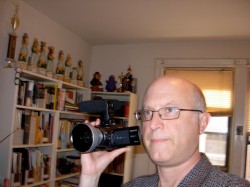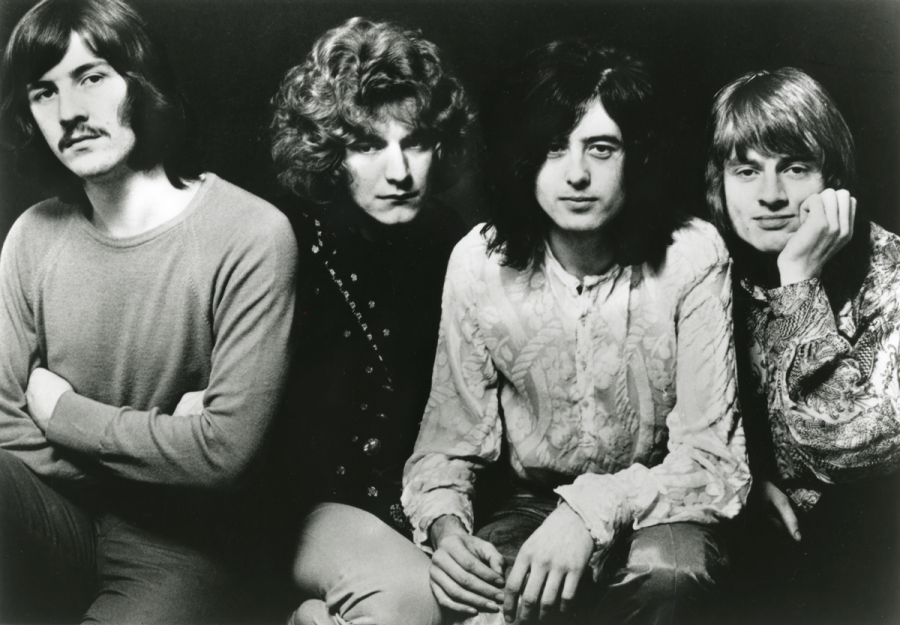Long before Led Zeppelin was riding motorcycles through hotel rooms and clothing middle schoolers everywhere, the band played a show for 50 people in Wheaton, Maryland. Or did it?
The strange, disputed tale of Led Zeppelin’s show at the Wheaton Youth Center is the subject of Led Zeppelin Played Here, the latest documentary by Heavy Metal Parking Lot co-director Jeff Krulik. A revised version of the film, which first premiered almost two years ago, shows Wednesday at the Avalon and Jan. 20 at Black Cat.
For five years, Krulik attempted to solve the mystery of Zeppelin’s alleged Wheaton show, tracking down record company promoters, interviewing supposed attendees and even asking Jimmy Page about it at a red carpet event at the Kennedy Center.
Though about a half-dozen Wheaton Youth Center regulars claimed that the show happened, there’s no real evidence to support their claims. No tickets for the concert have been found, since the center sold tickets at the door and used hand stamps. Fliers probably weren’t printed, either — promoter and DJ Barry Richards used his radio show to hype the concert.
In advance of the two local screenings, Bandwidth talked to Krulik about the birth of the concert industry, the fallibility of memory and why he makes films about bands he doesn’t like.
This interview was conducted over phone and email and has been edited for clarity and length.
Bandwidth: You mention in the documentary that you didn’t attend shows at the Wheaton Youth Center yourself. What fascinated you enough about the center to make a documentary about it?

Jeff Krulik
Jeff Krulik: Well, the reason why I didn’t go to any of the concerts is because I would’ve been 8 or 9 years old. I’m interested in these stories, but I wasn’t around. My curiosity, my obsession — a lot of that drives the documentary. I’ve always had an interest in the local cultural history or this area. I grew up here — I’m from Bowie and I went to the University of Maryland.
Did you know many of the people in the documentary personally?
I knew some of them personally. My original intent was to honor the Laurel Pop Festival, which was the unheralded, somewhat forgotten festival one month before Woodstock. Clearly if you went to it, you remembered it, but anyone who didn’t go to it didn’t realize it was going on. I’d wanted to do a documentary about that, but tracing the arc of Led Zeppelin allowed for a different kind of story because they had such a meteoric rise that year. And if you realize that maybe they played their first local gig at this modest youth center, in a gymnasium, it was pretty incredible. Not out of the realm of possibility, because a lot of those bands had humble starts — this was a place that other bands were playing.
It’s like I said in the movie — it started out to be a nostalgia trip, and now it’s become a mystery. And I didn’t do it because I’m a Led Zeppelin fan. I’m very interested in the cultural and music industry in this area and concertgoing and the concert scene and people who carved out the concert business from nothing. I mean, it was all unprecedented. These days the business is very button-down and ironclad. A very solid, billion dollar business that’s organized and is like any other multimillion-dollar business controlled by corporations. And it didn’t used to be like that.
“These days the [concert] business is very button-down and ironclad. A very solid, billion dollar business that’s organized and is like any other multimillion-dollar business controlled by corporations. And it didn’t used to be like that.”
When did these shows stop happening? When was the industry fully cemented, or institutionalized?
That kind of evolved in the early ‘70s as people became promoters. In this case, you had the Cellar Door, which was a club in Georgetown that basically realized that the owners were bringing in acts but the club could only hold 100 people. And there was such demand for the acts, they started putting on acts in Lisner Auditorium and selling 1,500 tickets in one night. All of the sudden the light bulb goes off.
Do you think that people remember the show differently?
This thing has kind of turned into a Rashomon. People remember things differently and that’s the challenge of it — to kind of connect the dots and see if they can be cross-checked. No one has come up with any smoking gun, like a picture or a diary entry. I don’t have hard proof, but I have supporting evidence, and I believe that it took place. You have people’s stories, and you have to kind of cross-check. For the most part, they do.
The popular belief was that it didn’t happen. It wound up going onto the Led Zeppelin website. The website now lists it as an unconfirmed rumor. The next night in Pittsburgh is not even listed; it was for a while, and that’s another phantom show. If there was a residency or if there’s ads in the paper, you’ve got proof. They were in Detroit, which ended Sunday night, and Thursday they played for three nights at the Boston Tea Party, which was advertised, and it took place. There’s Monday, Tuesday, Wednesday, where, I mean, they were somewhere.
We obviously live in an age where perhaps every single gig can be documented, whether it’s a Facebook event, post on a venue website or an Instagram picture. Is there anything lost by this, or should we be glad that we have documentation to keep our memories from falling victim to confabulation?
I suppose the verdict is still out on it. I’m biased because I came up during a period where there wasn’t such excessive documentation and you clearly were at that event or concert or party or day job and you basically had that experience as it unfolded, without sharing with the world. There seemed something most pure and genuine and more real about it. Of course, at 53 years old now, I can’t remember squat, and I’m envious of friends who wrote down every club show they saw, or in general kept a diary or journal. One of my most prized possessions is a creative writing class journal I kept for one semester in college. Boy, does that bring me back, and I really cherish that.
Why are you screening Led Zeppelin Played Here now?
We’ve changed it around a little bit, tightened it up. It’s because there are still venues that are looking for things to screen, and there are a lot of people who haven’t seen it and may have heard about it. I don’t have it online or for sale because of the rights issues. These kind of curated screenings are the only way to see it. I’ve had screenings with 500 people and screenings with five people. I’m willing to screen it anywhere that will have me. If it’s local, I’ll be there. It’s always fun to have a conversation afterwards and people will add their own commentary and stories and sometimes people will show up and say that they were there.
Do you think that these youth center shows were unique to D.C., Maryland and Virginia, or do you think that this was a nationwide thing?
I think it happened all over the country. Nobody starts off headlining — everyone starts in a garage somewhere.
As with Judas Priest in Heavy Metal Parking Lot, you’re not a Led Zeppelin superfan. Why did you decide to make documentaries about groups that you weren’t necessarily interested in yourself?
It’s not about the bands. The bands are the vehicle to explore something. In this case, I have always been interested in the machinery of rock concerts. And quite honestly, I’m interested in historical preservation. It’s my fascination with the places than the artists or the musicians — the buildings, the gathering spots. Heavy Metal Parking Lot was about the people, it wasn’t about Judas Priest. Both [co-director John Heyn] and I recognized that it was about the fans. The fact that it was Judas Priest playing that night — it was just dumb luck. We didn’t seek out Judas Priest that night, we just wanted to go to a heavy metal concert. … It was about the fans and about that scene that wasn’t profiled in the spirit that we did because no one really had cameras. We were using these clunky professional cameras from this public access studio, walking around this parking lot.
A theme in both Heavy Metal Parking Lot and Led Zeppelin Played Here is rock fandom and building an identity around being a fan of rock or a particular rock band. Is that something that you had in mind when you set out to make either or both films?
I wanted it to be more about the emergence of rock concert culture than anyone one particular artist. Led Zeppelin happens to be my hook to tell this story. It’s also a film about the vagaries of memory. And that’s something that emerged afterwards, I didn’t set out with that agenda originally. Often a film doesn’t truly emerge until after you’ve begun and collected hours of footage, at least that’s how I tend to work.
With Heavy Metal Parking Lot, what little agenda we had was to just focus on the fans and see what we might get. This was a time when heavy metal might not have been in the mainstream as today, but was still a dominant presence on MTV via Headbangers Ball, that sort of thing. You knew it was a popular arena attraction, even if there was little to no airplay. The bottom line is we didn’t necessarily set out with any one particular vision or goal in mind, we just plunged in and started gathering footage and then [watched] what eventually would emerge. Of course, with Heavy Metal Parking Lot, we had that answer in two hours. Led Zeppelin Played Here took nearly five years.
What is it that makes you a believer that this show happened?
I want to believe. I mean, I sought out as much evidence as I could find. I still wanted to find more proof, and I wanted to end the film. I started it in 2008, and I had to set a deadline — which was January 20, 2013 [ed note: the day of President Obama’s second inauguration] — to have something together for the preview screening. There are some minor tweaks here and there. But I just think that I was able to present as much supporting evidence. There was a public hearing. And someone said that I made this film without a shred of supporting evidence. I don’t have hard proof — but if you have some supporting evidence, that can help make the case.
The film shows Jan. 14 at Avalon and Jan. 20 at Black Cat.


